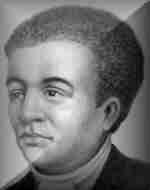 SKC Films Library SKC Films Library |
| SKC Films Library >> Science >> Astronomy >> Biography |
| Benjamin Banneker he never let the prejudices of his time stand in the way of his advancement
Benjamin Banneker was born to former slaves in 1731, and spent most of his formative years working on the family farm. He was able to obtain a good education at an elementary school run by Quakers, and he took full advantage of that education. In 1753, Banneker borrowed a pocket watch from a well-to-do neighbor; he took it apart and made a drawing of each component, then reassembled the watch and returned it, fully functioning, to its owner. Banneker then proceeded to use his drawings as blueprints from which he carved, out of wood, enlarged replicas of each part. Calculating the proper number of teeth for each gear and the necessary relationships between the gears, he built a working wooden clock that kept accurate time and struck the hours for more than 50 years. During the Revolutionary War, wheat grown on a farm designed by Banneker helped save Continental troops from starvation. After the war, Banneker took up astronomy, and in 1789 he successfully predicted an eclipse. In 1791, Banneker was hired as a technical assistant in the surveying of the new Federal District (now Washington, D.C.). After a year of work, the Frenchman hired by George Washington to design to capital, Pierre L'Enfant, stormed off the job, taking all the plans with him. Banneker saved the project, however, when he reproduced all of L'Enfant's plans for the streets, parks, and major buildings, from memory, in two days. From 1792 to 1802, Banneker published an annual Farmer's Almanac, for which he did all the calculations himself. The almanac was a top seller from Pennsylvania to Kentucky, and won Banneker fame as far away as England and France. Banneker used the fame he earned to promote social change, especially in regards to racism. He sent a copy of his first Almanac to Thomas Jefferson, along with a letter protesting that the man who declared that "all men are created equal" owned slaves. Jefferson responded with enthusiastic words, but no promise of political reform. Banneker spent his last years as a respected farmer, engineer, surveyor, city planner, astronomer, mathematician, inventor, author, and social critic. He died on October 9, 1806. Unfortunately for the sake of future posterity, the house in which Banneker spent most of his life burned down the day of his funeral, taking his wooden clock and many of his writings with it.
WEB SOURCES |
| SKC Films Library
>> Science >> Astronomy >> Biography This page was last updated on 05/25/2017. |
